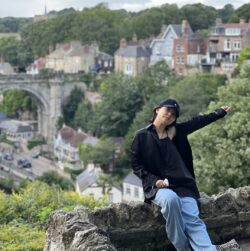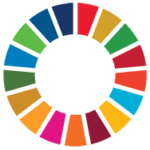Conversations with professionals in the sustainability sector: Shawnie Sun
Freya is a Student Sustainability Architect who had a project focused on Sustainable Careers. While in post she has worked alongside the University of Leeds Careers Service to organise a sustainable careers webinar during the Spotlight in Sustainability week. There, she shared tips and research on on-demand professional skills in the sustainability sector and general misunderstandings of careers in sustainability to increase students' employability in the sustainability sector.
In this blog, Freya discusses with Shawnie Sun about empowering women in sustainability industry: women in social entrepreneurship and skills for making changes towards sustainability, equity, and inclusiveness. She asks Shawne questions around women empowerment in sustainability, discussing the challenges that women face in social entrepreneurship and offering skills that can serve as starting points for students interested in a sustainable career.
Shawnie is fully committed to sustainability in the academic world. Having recently achieved a Master of Science in Sustainable Development with a specialization in Space and Society, upon graduation this year she will continue her academic pursuits in North America with a doctoral program in (human) geography. Additionally, Shawnie is dedicated to researching socio-ecological issues from environmental and social sustainability perspectives, and she aims to further her work in the field of social science in academia.

Freya Wang
The conversation
Freya: ‘Sustainability is a buzzword that we often hear in discussions surrounding climate change, social equity, and other related issues. But to you, what does sustainability really mean?’.
Shawnie: ‘The key lesson that I have learned from my years of education and experience in sustainable development is to find your own definition of “sustainability”. This is because sustainability can have vastly different meanings and implementations depending on the industry or discipline. Therefore, it is important to develop skills that are aligned with your stance, belief, and mission in sustainability.’
Freya: ‘Women and gender equality are important goals in sustainable development – not only goal number 5 in UN Sustainable Development Goals, but entangled with almost all sustainable issues. Social entrepreneurship in clean energy, for example, is supposed to benefit everyone, particularly women who are a relatively vulnerable group. What are some challenges you recognize through your studies?’
Shawnie: ‘Yes, unfortunately, women who attempt to start up social enterprises in sustainable sectors face disproportionately more difficulties. These challenges include economic, time, social, cultural, and symbolic capital constraints. Despite the increasing number of female investors and micro-loans aimed at women, there are still socio-cultural and legitimacy issues in both developed and developing areas. Women tend to spend more time on household work, have fewer opportunities to obtain systematic education in sustainable skills, and encounter systemic inequality in obtaining financial support. Women need to be better involved, empowered, and enabled in sustainable development efforts in order to challenge inequality and inequity.’
Freya then asked what Shawnie would recommend for solving those problems.
Shawnie: ‘Those challenges can be tackled from different sides, including top-down policymaking, community initiatives, social innovation, etc. Specifically, for students interested in making efforts towards interrogating inequity, there are some skills that can serve as potential starting points.
Firstly, reading broadly and conducting fieldwork are important to understand the real-life struggles of vulnerable groups in other communities. Last semester, participating in a field trip to South Africa allowed me to witness imbalanced resource allocation and real-world female struggles in extreme weather that I had never experienced before. Broad reading and fieldwork can help identify specific sustainability problems that trigger your passion.
Secondly, system thinking is crucial to understanding sustainability. Sustainable development encompasses all societal, environmental, and ecological aspects. Although synergetic economic and ecological optimisation seems to be a common sustainability narrative, it is also essential to think about “sustainability for whom” and “how to make the benefit shared fairly”. A socio-ecological systems approach is a helpful academic diagram to organise your brainstorming, but developing your own system thinking model from day one in sustainability is also beneficial in mapping your ideas and triggering your creative and inclusive thinking.
Lastly, effective collaboration and communication skills are paramount in making sustainable efforts a reality. As students, we become familiar with these skills through coursework. Further, it is important to apply them in the real world, such as in campus organizations, community initiatives, and online events. Collaboration between different actors is particularly important in empowering vulnerable groups, and pitching our ideas to stakeholders has always been the first step in making the effort happen. Women may face unique challenges in sustainable development, and I believe systemic transformation is pivotal. Nevertheless, for those who want to commit to a more sustainable, equitable, and inclusive future, those skills might be a good point to commence.’
Freya finishes by thanking Shawnie for their unique point of view targeting those tough but also meaningful improvements that the world can potentially pursue.
If you enjoyed this blog, read Freya’s other blog on her conversation with sustainability professional Qi Xia.
Keep up to date on the latest news
-
-
- Follow us on Twitter: @UoL_Sus
- Follow us on Instagram: @UoL_Sus
- Follow us on Facebook: @UoLSustainability
- Sign up to our Sustainability newsletter
-
 We use the United Nations Sustainable Development Goals (SDGs) as a framework to guide our activity.
We use the United Nations Sustainable Development Goals (SDGs) as a framework to guide our activity.
Find out more about our impact on the SDGs.
